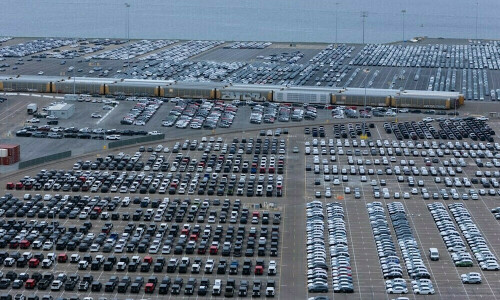Trump Administration to Ease Automotive Tariffs
The Trump administration is set to mitigate the impact of automotive tariffs. On Tuesday, officials announced measures to reduce duties on foreign parts used in domestically manufactured vehicles. The administration will also prevent tariffs on imported cars from accumulating on top of existing levies.
Commerce Secretary Howard Lutnick stated, “President Trump is forging a crucial alliance with domestic automakers and American workers.” He added, “This agreement represents a significant triumph for the President’s trade strategy by incentivizing domestic manufacturing while offering a pathway for manufacturers committed to investing and expanding within the U.S.”
The Wall Street Journal initially reported that car companies subject to tariffs would not be charged additional levies on materials like steel and aluminum. Furthermore, reimbursements would be issued for tariffs already paid on these materials.
A White House official has verified the report, confirming that the policy adjustment would be formalized on Tuesday.
President Trump is scheduled to visit Michigan on Tuesday to commemorate his initial 100 days in office. During this period, he has actively sought to reshape the international economic landscape.
This adjustment to automotive levies reflects a broader trend within the administration toward greater flexibility on tariffs. These tariffs have previously introduced volatility into financial markets, generated uncertainty for businesses, and raised concerns about a potential economic downturn.
Earlier on Monday, automakers indicated that they anticipated tariff relief from President Trump prior to his visit to Michigan. Michigan is the home of the Detroit Three automakers and over 1,000 auto suppliers.
Last week, a coalition of U.S. auto industry groups implored President Trump to refrain from imposing 25% tariffs on imported auto parts, warning that such measures would decrease vehicle sales and escalate prices.
President Trump had previously suggested plans to implement 25% tariffs on auto parts by May 3.
In their letter, the industry groups warned that “Tariffs on auto parts will disrupt the global automotive supply chain, triggering a domino effect that increases vehicle prices, reduces sales, and makes vehicle servicing and repair more expensive and unpredictable.”
The letter, addressed to U.S. Trade Representative Jamieson Greer, Treasury Secretary Scott Bessent, and Commerce Secretary Lutnick, was signed by groups representing General Motors, Toyota Motor, Volkswagen, Hyundai, and others.
The letter further noted that “Most auto suppliers lack the capital to withstand a sudden tariff-induced disruption. Many are already struggling and risk production halts, layoffs, and bankruptcies,” emphasizing that “the failure of even one supplier could halt an automaker’s production line.”



Comments (0)
No comments yet. Be the first to comment!
Leave a Comment